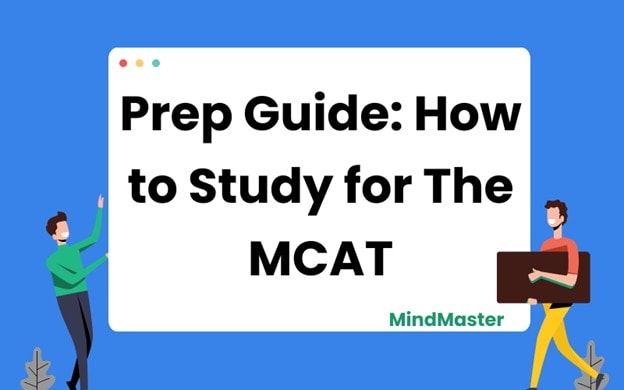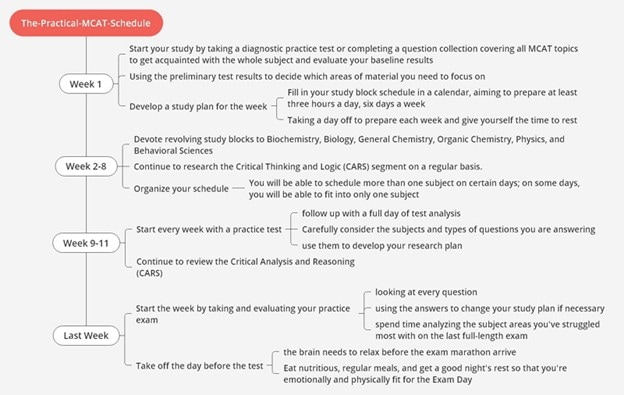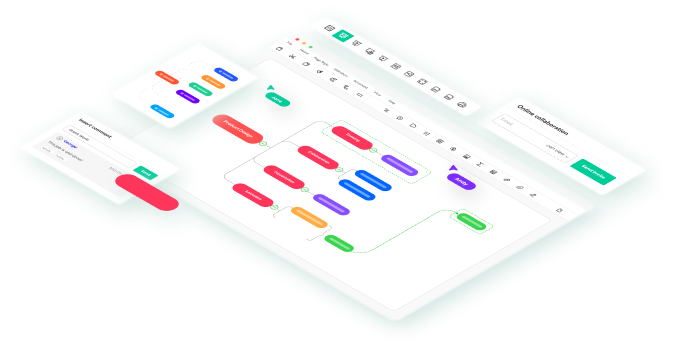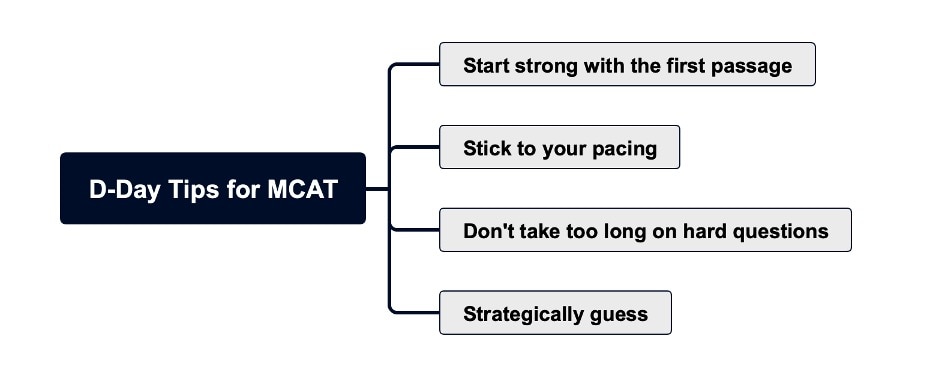
In this article
What Is the MCAT Test
The MCAT (Medical College Admission Test) is a national standardized test used by nearly all medical schools in the United States to assess candidates for access to their medical programs.
Many medical school boards put as much weight on the applicant's MCAT Test score as they do on their GPA.
If the student's MCAT performance and GPA provide similar evaluations of the applicant's credentials, it is normal for admission boards to place more weight on the MCAT ranking.
The MCAT Test Dates in 2025
Your exam date will depend on when you apply to a medical school.
- August/September exam dates are ideal for students who are already in school for quarter semesters, as this schedule allows ample time in the summer for studying.
- The January exam dates are also perfect for students since they can take advantage of the winter break to prepare.
- If you would like to pick medical schools to apply to, consider your MCAT ranking. The last test date for the MCAT 2025 is September 2025.

How To Build a Study Schedule for the MCAT
Below is a step-by-step guide to building your study schedule, consisting of four steps.

Choosing the Date of the MCAT Test
To construct your MCAT study plan, pick the date of the exam. This is not always an easy question to answer, so there are a few questions that you can ask yourself before choosing a test date.
- When are you planning to apply to medical school?
- Have you taken the subjects that are required for the MCAT?
Construction of the MCAT Study Schedule: Content Phase
You can look at the structure of the MCAT study schedule. You should think of the MCAT study schedule as two separate phases.
Seventy percent of the time should be spent on learning materials, while 30 percent should be spent on practice.
The second part of the analysis is practice-heavy with some material. During this process, the numbers shift, and you can concentrate on 70 percent practice and 30 percent content.
Based on the MCAT Research Schedule: Practicals
You are now planning out the second part of your MCAT study journey. The majority-practice process will be 70 percent preparation and 30 percent material.
When you take MCAT practice questions during this process, it's not enough to take the practice section, skip over the answer to the option of explanations, and carry on.
Refine the MCAT Study Plan
Often, students are reluctant to change their schedule once they've created it. The study schedule’s point is to lead you through the study process — it's not a regulation, and it is not supposed to be fixed and rigid.
Refining your schedule when you prep for a test like the MCAT is not only normal but is also required and strongly encouraged.
The Practical MCAT Schedule
The following is a practical MCAT schedule for three months to prepare for the examination, with detailed plans arranged for different time periods.

Week 1
- Start your study by taking a diagnostic practice test or completing a question collection covering all MCAT topics to get acquainted with the whole subject and evaluate your baseline results.
- You can use the preliminary test results to decide which areas of the material you need to focus more on.
- Develop a study plan for the week. Fill in your study block schedule in a calendar, aiming to prepare at least three hours a day, six days a week.
Week 2-8
Devote revolving study blocks to Biochemistry, Biology, General Chemistry, Organic Chemistry, Physics, and Behavioral Sciences.
Also, continue to study the Critical Thinking and Logic (CARS) segment regularly. Organize your schedule around your existing commitments.
Week 9-11
Start every week with a practice test and follow up with a full day of test analysis.
Carefully consider the subjects and types of questions you are answering, and use them to develop your study plan. Continue to review the Critical Analysis and Reasoning (CARS) section regularly.
Last Week
Start the week by taking and evaluating your practice exam. Look at every question and use the answers to change your study plan.
For the next few days, spend time analyzing the subject areas you've struggled most with on the last full-length exam.
Take off the day before the test; the brain needs to relax before the exam marathon begins.
How To Study for the MCAT

Start Early, Don’t Cram
It is important to stress how important it is to start studying for the MCAT early. Don't cram for the MCAT. Start your actual exam planning two to six months before the test.
Do the Practice Problem
Though information acquisition is an essential part of studying for the MCAT, it is not enough.
The MCAT is designed to assess your ability to adapt your understanding of scientific ideas in diverse contexts – to measure your ability to think objectively.
The best way to improve your logical thinking capacity is to do some practice problems as it relates to prospective MCAT results.
Don’t Just Focus on Your Strengths
Although relying exclusively on your strengths can be a good strategy for certain standardized exams, it is not the best test planning technique for the MCAT.
If you plan to prepare on your own or take the MCAT training course, use the practice tests to help you determine where your strengths and weaknesses lie.
Take It Easy. Don’t Overload Yourself
If you're like most pre-graduate students, you'll start training for the MCAT when you're already completing your undergraduate degree. Don’t overburden your workload.
Use Mind Maps
Mind mapping is the perfect tool to make learning fun and, at the same time, to cover a topic to its depth.
Wondershare EdrawMind is one of the best tools for creating mind maps, helping you sort out everything for more productive results.
EdrawMind is available in both desktop and online versions, making it one of the best tools to create mind maps.
Get Expert Advice
Get guidance from people who have received a high score on the MCAT. Find out what research materials they used during their training and what preparation methods they recommended.
Know When You’re Ready
By the time you've finished most of your undergraduate college courses and are prepared to take the MCAT, you've proven that you can memorize knowledge, use formulas, and learn new concepts.
MCAT assesses your ability to understand and apply ideas rather than your ability to absorb and memorize facts.
Recommended Resources for the MCAT
The tips and roadmaps provided above are helpful. However, the quality of materials you study is really what will make you pass your upcoming MCAT exam.
Thus, it’s good to rely on good reviewers or apps to help you stand out.

The resources provided below will be a mix of reading or practice materials, so make sure to check them out.
For Guides
Start with the official AAMC MCAT Official Guide. It provides an overview of each section, sample questions, and scoring explanations. It costs some money, though.
For structured review, Kaplan MCAT Complete 7-Book Subject Review and The Princeton Review MCAT Subject Review are excellent resources. Both offer detailed lessons and realistic practice questions that mirror actual exam difficulty.
For Tests
The best practice exams are the AAMC Practice Tests, since they’re made by the same organization that designs the MCAT.
Supplement them with third-party practice from Next Step/Blueprint or Altius, which provide analytics to track performance and pinpoint weak topics. These tests help students adjust timing, endurance, and test-taking strategies.
For Study Tools
Platforms like Anki and Quizlet are useful for active recall and spaced repetition, especially for high-yield science terms.
For note organization, use a visual tool like EdrawMind—it’s great for mapping relationships between biological systems or chemical reactions.
It works online and offline, allowing students to connect concepts instead of memorizing them in isolation.
For Videos and Reviews
Free video resources such as Khan Academy MCAT Collection and MCAT Self Prep simplify complex ideas with clear examples.
These are ideal for reviewing hard topics like physics or biochemistry on tight schedules. Combining these videos with practice problems builds both understanding and speed—two critical factors for test success.
How To Boost Efficiency With Mind Maps
Above are general ways to prepare for the MCAT. To be specific, here are ways that you can use mind maps for efficiency:
- Use it as a reviewer. Before your practice exams, revisit your mind maps instead of lengthy notes. The visuals help you recall large portions of material quickly and see how everything fits together.
- Organize high-yield topics. Group essential terms and formulas by category, and you can identify weak areas faster. Try looking for blogs or posts that organize often-asked questions in the MCAT for extra efficiency.
- Summarize practice test feedback. When analyzing mistakes from practice questions, add them to your existing mind maps. This turns errors into review points and strengthens problem-solving skills.
- Track progress and retention. You can color-code sections to mark how confident you feel in each topic, like green for strong, yellow for moderate, and red for weak.
Lastly, make sure to use digital tools throughout it all, such as EdrawMind. Using mind maps is a lot faster with built-in creative and formatting options that can accommodate your ever-growing review.
D-Day Tips for the MCAT
As for the actual exam day (D-Day), here are some tips that you can keep in mind. A test is not only about knowledge but also strategy. Thus, here are strategies to keep in mind:
- Start strong with the first passage. The first section sets the tone. Take the opening minutes to read the first passage carefully and find your rhythm.
- Stick to your pacing. Each section is long, and time passes quickly. Divide the time by the number of passages (roughly 8–10 per science section). Aim for around 9–10 minutes per passage, leaving a few minutes for review.
- Don’t take too long on hard questions. If a question feels unfamiliar or time-consuming, mark it and move on. You can always come back later. Spending too long on one passage can cost you easy points elsewhere.
- Strategically guess. Related to the above tip, make sure to eliminate clearly wrong options, make your best guess, and move on if you’re unsure. A filled bubble is always better than a blank one.
Conclusion
During your MCAT planning time, avoid overwhelming yourself by taking too many undergraduate courses.
It is recommended that the study plan you follow fits your learning style, meets your timetable, and emphasizes content analysis and testing equally. You can easily learn how to study for the MCAT test.
With EdrawMind, you can quickly create easy mind maps to study effectively. The software offers 12 different map types, 33 themes, and over 700 clip art materials, providing almost unlimited possibilities for designing your study maps.
FAQs
Before you start your MCAT journey, here are some frequently asked questions related to the exam. You might pick up something valuable as you read this – and that is really our goal in this article. So, read through them properly.
-
1. When should I take the MCAT for medical school applications?
Many students begin their MCAT journey during the spring or summer of their junior year. You can try starting your MCAT study between March and June for optimal results. This schedule allows retakes before applications reopen in case you fail the first attempt. However, the best time really is when you’ve finished core subjects in the MCAT, like biology or other allied subjects. -
2. How long should I study for the MCAT?
Students usually prepare for three to six months. This involves 10-20 hours per week. It depends on the level of your knowledge. However, there’s nothing wrong with starting early and dedicating long hours. It’s your future that’s on the line as you take the MCAT exam. Your goal is to get into the good schools. -
3. How many times can I take the MCAT?
In one testing year, it’s possible to take it three times. However, across two years, it seems that you can only take it four times. Most medical schools prefer to see improvement every time you take the exam, in case you fail. As such, make sure to take them with intent, but the goal is to pass it on the first take. Just dedicate a lot of time to it, and you’ll be sure to get into a good school. -
4. What section of the MCAT is the hardest?
Many students find CARS (Critical Analysis and Reasoning Skills) the toughest since it tests comprehension rather than memorization. Improving this section requires consistent reading practice with dense materials such as academic journals or opinion essays—not just science reviews. -
5. Can I study for the MCAT without expensive prep courses?
Yes. Many students succeed using free or low-cost resources. Combine AAMC official materials with free tools like Khan Academy videos, Anki decks, and Reddit study schedules. Building a structured plan and tracking your progress regularly can be just as effective as paid courses.








